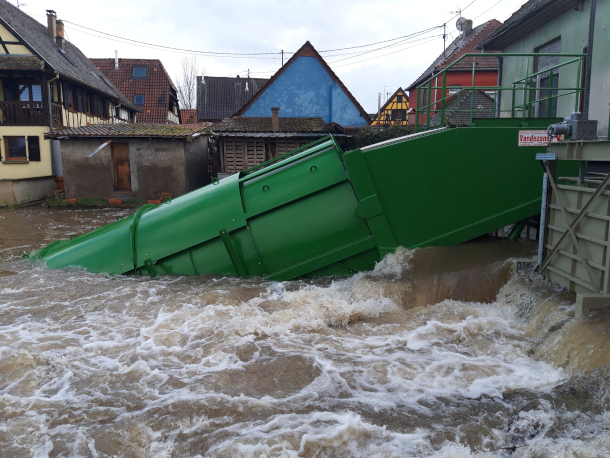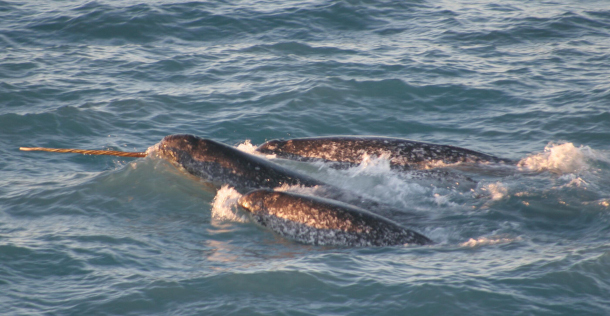Beyond the Headlines
Air Date: Week of March 3, 2023

Hydropower equipment in Muttersholtz. The town’s municipal buildings are all powered by clean energy, with plans to include residential homes soon. (Photo: Laurent Jerry. Wikimedia Commons, CC BY-SA 4.0)
In this week’s trip beyond the headlines, contributor Peter Dykstra and Host Jenni Doering discuss the impressive clean energy achievement of a small town in France. Next, they consider a study about growing threats to narwhals from shrinking Arctic sea ice before going back in history for a look at the Rivers and Harbors Act of 1899.
Transcript
DOERING: It's time now for look beyond the headlines with Peter Dykstra. Peter is a Living on Earth contributor and he joins us from Atlanta, Georgia. Hey, Peter, what you got for us this week?
DYKSTRA: Hi, Jenni. Start out with a little good news, or at least some potentially inspirational news for communities around the world. There's a small village in the northeast part of France called Muttersholtz. It's right along the German border near Belgium, in the area where a lot of the big battles for World War One and World War Two were fought. Now they're battling on behalf of clean energy. And that little town has all of its municipal electric power paid for because they've invested in conservation and in solar and in turbines put in the local river in order to generate water power. Those three things are saving their taxpayers a lot. The town even makes some money back when they sell their excess electricity back to the grid. Individual homeowners and those taxpayers still have to pay for their own electricity. But it's a big step forward not having to pay for streetlights and everything that might power a community.
DOERING: Wow. Well, this comes at just the right time, Peter, because as you know, Europe is facing sky high energy bills.
DYKSTRA: That's right, and largely because of Russia's invasion of Ukraine and all of the pressure that's been put on Europe to move away from buying fossil fuels from Russia. They've made the conversion. It's cost everyone some money, except for this one little town.
DOERING: Indeed. Well, what else do you have for us this week, Peter?
DYKSTRA: There's a story about narwhals in the Arctic; narwhals are those really cool creatures that look like something out of the cartoons or out of Dr. Seuss or out of a B–52's song. The males have a spiraling tusk that extends for a long way out of their snouts. But narwhals may have trouble in the future in a warming Arctic Ocean in finding enough food to continue to thrive. There's concern, as expressed in a recent paper in the journal Biology Letters, that narwhals may be too reliant on winter feeding to have good prospects for survival.

A pod of narwhals. A recent study suggests that narwhals may be overly dependent on winter hunting, which may be negatively impacted by melting arctic ice. (Photo: NOAA, Wikimedia Commons, public domain)
DOERING: How are narwhals doing as a species? I mean, we sometimes hear too late about species that are on the brink of extinction. But how are they doing?
DYKSTRA: They're not considered endangered, but there's a real concern that we may be pushing them in that direction.
DOERING: Hey, Peter, what do you have for us from the history vaults this week?
DYKSTRA: Last week, I talked with Bobby Bascomb about a 1799 United States law, the Federal Timber Purchases Act, probably the first US conservation-oriented law. Nearly 100 years later, to the day, March 3rd, 1899, Congress passed the Rivers and Harbors act, later signed by President William McKinley. And there's a big section of this law called the Refuse Act that offered criminal penalties for dumping in the waterways and also rewards for anyone who turned in dumpers. That part of the law, the Refuse Act, went mostly neglected until the 1960s, when some of the lawyers and activists working to clean up the Hudson River used that old and neglected law to help clean up the Hudson. Environmentalists and advocates found another tool for their toolbox to help clean things up. And that law has been a key to building more and more protection for American waterways, culminating of course, in the Clean Water Act passed in the 70s and strengthened since then.
DOERING: Well, we can thank the Congress of 1899 for giving us our first clean water law in the US. Thank you so much, Peter. Peter Dykstra is a Living on Earth Contributor. We'll talk to you next time.
DYKSTRA: All right, Jenni. Thanks a lot, and we'll talk to you soon.
DOERING: And there's more on the stories on the Living on Earth website. That's loe.org.
Links
This French village enjoys ‘no bills’ after building wind turbines and solar panels
Learn more about how blue-collar fishermen used the Clean Water Act to clean up the Hudson River
Living on Earth wants to hear from you!
Living on Earth
62 Calef Highway, Suite 212
Lee, NH 03861
Telephone: 617-287-4121
E-mail: comments@loe.org
Newsletter [Click here]
Donate to Living on Earth!
Living on Earth is an independent media program and relies entirely on contributions from listeners and institutions supporting public service. Please donate now to preserve an independent environmental voice.
NewsletterLiving on Earth offers a weekly delivery of the show's rundown to your mailbox. Sign up for our newsletter today!
 Sailors For The Sea: Be the change you want to sea.
Sailors For The Sea: Be the change you want to sea.
 The Grantham Foundation for the Protection of the Environment: Committed to protecting and improving the health of the global environment.
The Grantham Foundation for the Protection of the Environment: Committed to protecting and improving the health of the global environment.
 Contribute to Living on Earth and receive, as our gift to you, an archival print of one of Mark Seth Lender's extraordinary wildlife photographs. Follow the link to see Mark's current collection of photographs.
Contribute to Living on Earth and receive, as our gift to you, an archival print of one of Mark Seth Lender's extraordinary wildlife photographs. Follow the link to see Mark's current collection of photographs.
 Buy a signed copy of Mark Seth Lender's book Smeagull the Seagull & support Living on Earth
Buy a signed copy of Mark Seth Lender's book Smeagull the Seagull & support Living on Earth

